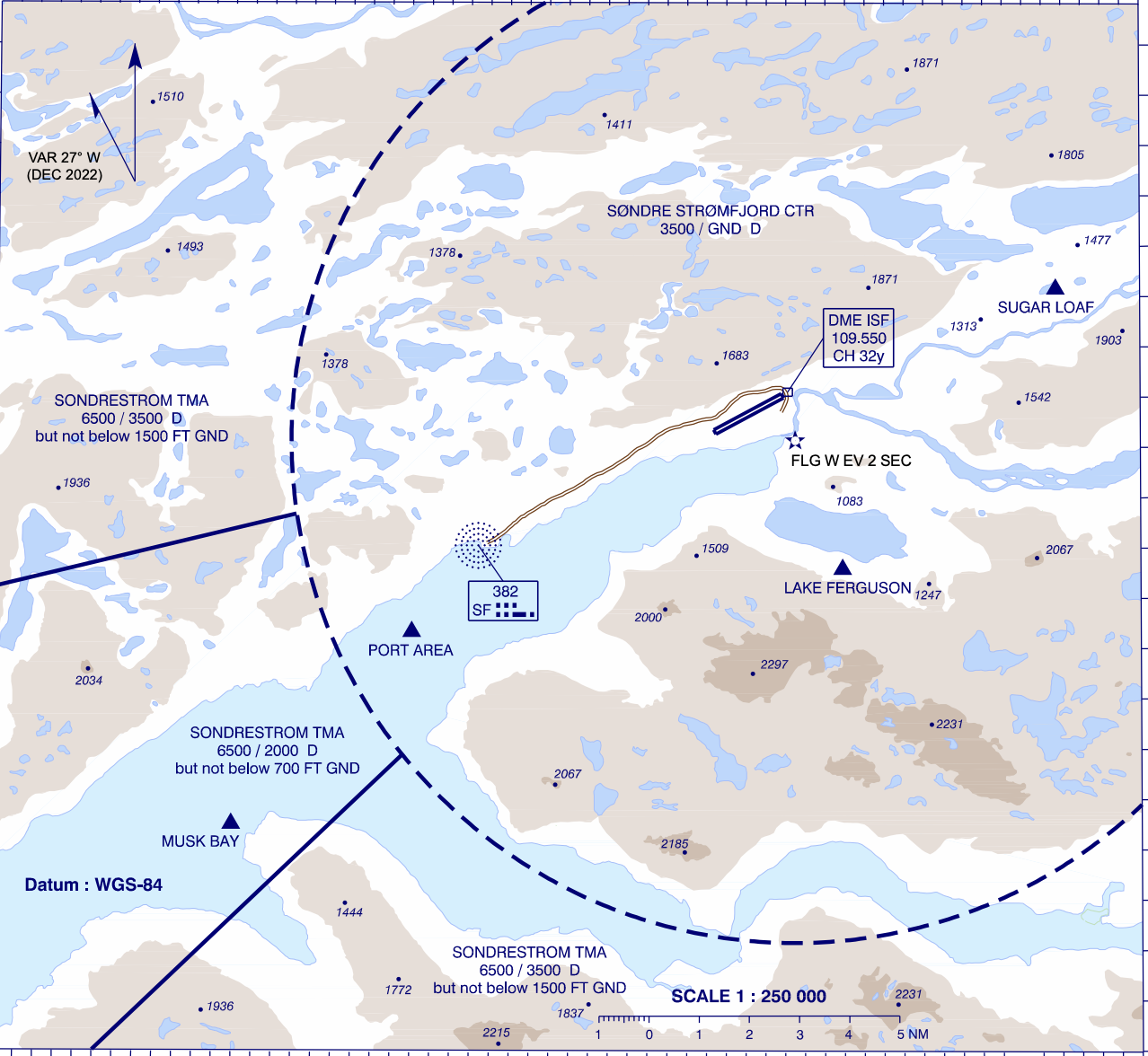Sondrestrom TWR
Sondrestrom Tower (BGSF_TWR) provides clearance delivery, ground, and tower control.
Delivery
DueNOTE: to high terrain surroundingTypically, the aerodrome,preferred runway configuration is RWY 09 isfor alwaysarrivals the active arrival runway, and/ RWY 27 isfor alwaysdepartures. See the active"Runway departureConfiguration" runway,below regardlessfor more details.
Overview of winds.SIDs
|
TERMINATING |
|
|
|
09 |
27 |
|
|
BAVKO |
1A |
1B |
|
GILPO |
1A |
1B |
|
INPOD |
1A |
– |
|
ISTEC |
1A |
1B |
|
KEMOS |
1A |
1B |
|
WUTAN |
1A |
1B |
|
Initial Climb: FL290 (or RFL if lower) |
||
Clearance Procedure
All BGSF departures from Kangarlussuaq:
Themet reportshall be givento all departures.There is no standard initial climb. Traffic permitting, aircraft may be cleared alltheway to RFL.The standard departure instructions are as follows:"After departure runway 27 climb straight ahead, passing 5300ft proceed directlatest[FIRSTweatherFLIGHT(metPLANreport)WAYPOINT]..."
Note: Pilots often misunderstand the above as meaningwith their initial climb is 5300ft. Controllers should emphasize that 5300ft is the altitude at which the aircraft should turn off runway track while still continuing to climb, not the altitude where they should stop their climb.
As a reminder:
Flightsleaving BGGL FIR and/or climbing above FL285are considered oceanic, and the oceanic routing & Mach number must be included in theIFR clearance.Flights stayingwithinBGGL FIR below FL285are considered domestic, and the oceanic routing & Mach number may be omitted from the clearance.
Controllers may split the meteorological report and clearance into two transmissions. Nonetheless, controllers should budget time for giving both the full clearance and the met report, as well as pilot readbacks for both – the total exchange may take quite some time.
The following is an example interaction of a full met report and clearance.E.g.,
🎧 GRL418,
are youready to copythe weather and yourclearance?🧑✈️ Ready to copy, GRL418.
🎧 GRL418, cleared to Keflavik via the WUTAN 1A departure, climb via SID FL290, Mach .80, squawk 3126.
🧑✈️ Cleared to Keflavik via the WUTAN 1A departure, climb via SID FL290, squawk 3126.
🎧 GRL418, readback
QNHcorrect.only.Are you ready to copy the weather?🧑✈️ Ready to copy, GRL418.
🎧 GRL418, Kangarlussuaq met report at time 50, automatic, winds 060 degrees 9 knots, visibility 10 kilometers or more, no directional variation, clouds broken at 21000ft, temperature plus one, dewpoint minus four, QNH 1014.
🧑✈️ QNH 1014, GRL418.
🎧 GRL418, readback correct.
Oceanic
RWY 27 Departure Procedure (Non-RNAV)
🧑✈️This Clearedis necessary to Keflavik,avoid afterhigh departureterrain runwaynear 27the climbairport straight ahead, passing– 5300ft proceedis directthe GANGI,minimum PEVAR,safe 66altitude Northwithin 3525 West, SUKED, INGAN, climb FL330, Mach .80, squawk 3126, GRL418.
🎧 GRL418, readback correct. Report ready for push and start.
Ground
There are two main parking locations at BGSF:
- The North Apron is for scheduled passenger flights.
- The East & West Aprons are for cargo, GA, and other flights.
Otherwise, BGSF has a fairly simple ground layout. The most important thing to note is that if an arrival requires full length for landing, it will be vacating the runway from the same taxiways as departing aircraft.
Controllers may consider instructing arrivals to make a 180 and backtrack to vacate, in order to avoid coming face-to-face with departing aircraft.
Tower
Runway Configuration
Due to high terrain near the airport, RWY 09 is the preferred arrival runway and RWY 27 is the preferred departure runway. Therefore, if the tailwind component for both runways is less than 5 KTS, TWR shall designate RWY 09 as the arrival runway and RWY 27 as the departure runway.
In this configuration, departures will depart into the path of arrivals. TWR must coordinate with APP to ensure that large enough gaps are left in the arrival stream for aircraft to depart between arrivals.
When the tailwind component exceeds 5 KTS for either RWY 09 or RWY 27, TWR shall revise the runway configuration to depart and/or arrive on whichever runway has the strongest headwind component.
Sondre Stromfjord Control Zone (BGSF CTR)

Note: the northeastern-most area of the BGSF CTR is cut off in the above image.
The Sondre Stromfjord Control Zone (BGSF CTR) surrounds BGSF from GND – 3500ft.
There are three visual reporting points which aircraft may follow while entering/exiting the CTR – Port Area, Musk Bay, and Sugar Loaf.
Due to BGSF's unique runway configuration (RWY 09 for arrivals / RWY 27 for departures), departures will be taking off into the arrival path. During periods with a heavy stream of arrival traffic, TWR should coordinate departures with APP to ensure adequate spacing between arrivals where aircraft can depart.
Missed Approaches
TWR shall instruct aircraft to follow the standard missed approach, and coordinate all missed approaches with APP prior to transferring to APP.
For aircraft unable the standard missed approach, TWR should instruct them to perform a visual climb toand 6000ftcaution tothem KEFOPof (ifhigh onterrain. theThe RNPMSA approaches)within or25 SFNM NDBof (ifBGSF onis any other approach.) Alternatively, TWR may coordinate radar vectors with APP.5300ft.
